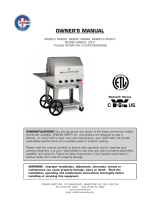
3
I N S TA L L AT I O N R E Q U I R E M E N T S
IMPORTANT NOTE: This installation must
be completed by a qualified installer,
service agency or gas supplier.
IMPORTANT NOTE:
Save these Installation
Instructions for the local inspector’s use.
Please read the entire Installation Instruc-
tions prior to installation.
Installer:
please retain these instructions
for local inspector’s reference, then leave
them with the homeowner.
Homeowner:
please read and keep these
instructions for future reference and be sure
to read the entire Use & Care Information
prior to use.
IMPORTANT NOTE:
This appliance must be
installed in accordance with National Electrical
Codes, as well as all state, municipal and local
codes. The correct voltage, frequency and
amperage must be supplied to the appliance
from a dedicated, grounded circuit which is
protected by a properly sized circuit breaker or
time delay fuse. The proper voltage, frequency,
and amperage ratings are listed on the product
rating plate.
Record the model and serial numbers before
installing the gas range. Both numbers are
listed on the rating plate, located under the
drip pan that supports the cooking grates, on
the left inside wall of the range. Refer to the
illustration below. The rating plate for Model
R482CF is located on the right inside wall.
W O L F G A S R A N G E S
IMPORTANT NOTE:
Installation and service must be
performed by a qualified installer,
service agency or the gas supplier.
Warranty service must be performed
by a Wolf authorized service center.
Do not store or use gasoline or
other flammable vapors and liquids
in the vicinity of this or any other
appliance.
A ventilation hood is recommended
for use with the Wolf gas range.
WHAT TO DO IF YOU SMELL GAS:
Do not try to light any appliance.
Do not touch any electrical switch.
Do not use any phone in your
building.
Immediately call your gas supplier
from a neighbor’s phone. Follow the
gas supplier’s instructions.
If you cannot reach your gas
supplier, call the fire department.
If the information in this book is
not followed exactly, a fire or
explosion may result, causing
property damage, personal injury
or death.
R
AT I N G P L AT E
I N F O R M AT I O N
Model Number
Serial Number
This range can tip. Injury to
persons could result. Install the
anti-tip device packaged with this
range according to instructions
on page 11.
Rating plate location
Location of rating plate
on the inside wall





















